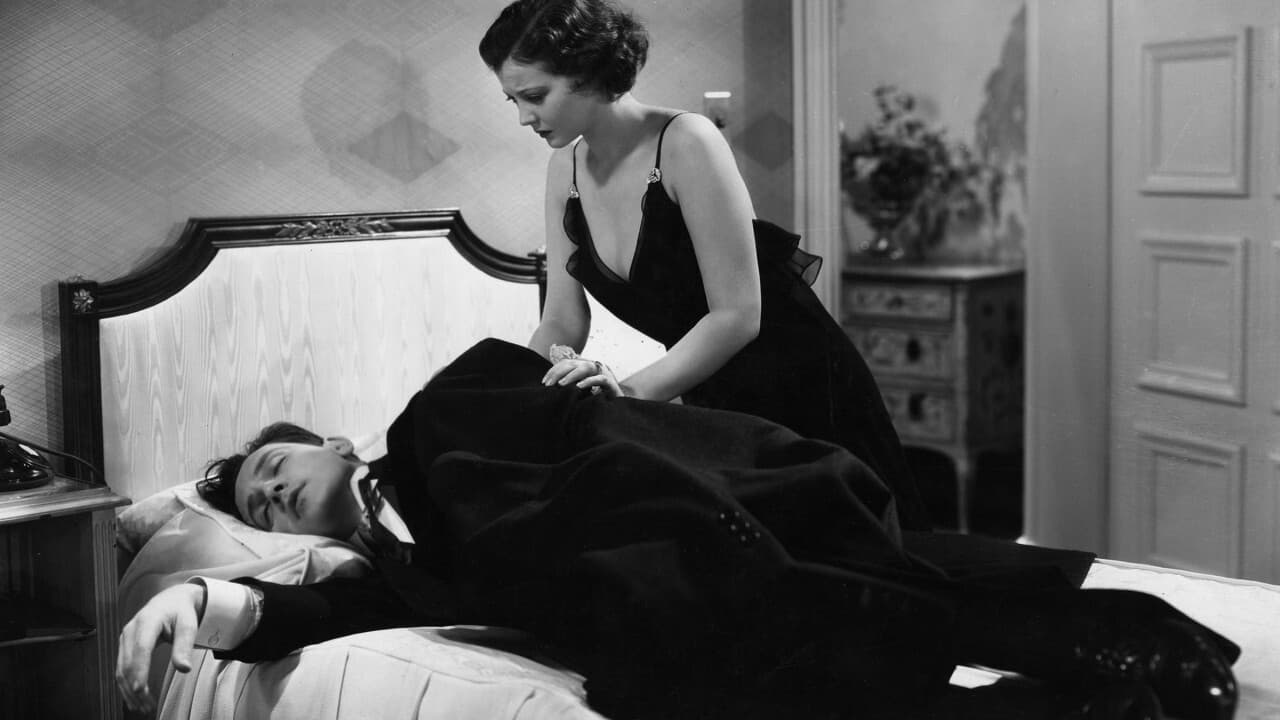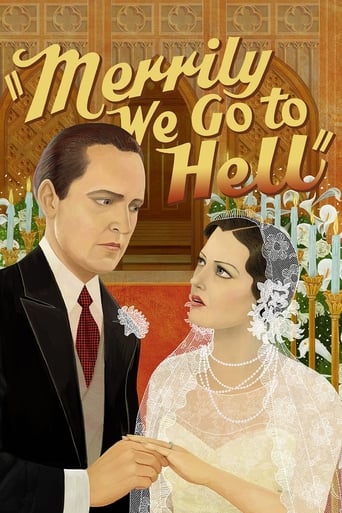Interesteg
What makes it different from others?
WasAnnon
Slow pace in the most part of the movie.
Hadrina
The movie's neither hopeful in contrived ways, nor hopeless in different contrived ways. Somehow it manages to be wonderful
Bob
This is one of the best movies I’ve seen in a very long time. You have to go and see this on the big screen.
HotToastyRag
It's pretty funny to think that in the span of seven years, one movie could have "hell" in the title, and another broke barriers by having an actor say, "damn." In this pre-Code drama, Fredric March is an alcoholic who tends to toast his drinks by uttering the title of the movie. Sylvia Sidney, a good girl who loves him in spite of his behavior, doesn't quite get that he actually means his toast. It isn't long before he does drag her down with him. . .How many times has Fredric March played in a movie with a drunk scene? I can come up with seven, off the top of my head. The point is, he's had tons of experience, and he does it very well, so if you like to see him in these types of roles, you can give this one a whirl. Merrily We Go to Hell is a very nasty pre-Code movie, with an enormous amount of suggestive dialogue, and situations that, two years later, would never have been filmed. Open marriages, promiscuity, and orgies are made pretty clear, even though nothing is showed.
To me, this was a pretty black-and-white film. Bad guy, good girl, bad behavior, good heart. I'd recommend watching My Sin or Call Her Savage instead if you want some pre-Code fun.
Michael_Elliott
Merrily We Go to Hell (1932)** 1/2 (out of 4) Reporter Jerry Colbert (Fredric March) is in a drunken state when he meets the beautiful Joan (Sylvia Sidney) who just happens to be the daughter of a millionaire. The two hit it off but before long Joan realizes that Jerry has a major issue with alcohol. At first her love is enough to keep him away from the drink but before long he's back on the bottle.MERRILY WE GO TO HELL has one of the greatest titles of any movie in history but sadly the film itself isn't all that great or even good for that matter. This here is another Pre-code that manages to have some good performances that go wasted on a story that just isn't all that interested. What's worse is the fact that the story is pretty darn predictable from start to finish without any real surprises or fresh moments.The best thing going for the film are the performances. March, fresh off his Best Actor Oscar win for DR. JEKYLL AND MR. HYDE, offers up a good performance in the role of a drunk who can't help but want to party more than stay with his wife. Adrianne Allen plays his former lover and she offers up a fine performance. George Irving has some excellent moments playing Sidney's father. You've even got an early performance from Cary Grant. As far as Sidney goes, she's certainly the best thing about the film. She handles the dramatic moments perfectly but the greatest part comes at the start of the picture with that bubbly personality, which makes you understand why an alcoholic would give up the bottle for her.This here was years before THE LOST WEEKEND so the subject of alcoholism isn't really dealt with in a strong or graphic way. More than anything we just see the March character as either having too much fun or passing out during moments that he's needed. As it stands, MERRILY WE GO TO HELL might appeal to fans of the cast but the film itself has quite a few problems.
mark.waltz
Funny drunks aren't realistic drunks, and until Billy Wilder created a great part for Ray Milland, alcoholism was rarely treated seriously. Fredric March is a struggling playwright, favorite of the party scene who hasn't hit the big time. He falls in love with wealthy socialite Sylvia Sidney whose domineering father (George Irving) despises March and does everything in his power to dissuade her from marrying him. But they do, success follows for March, and his illness leads to degradation and tragedy. To teach her husband a lesson, in the meantime, Sidney becomes a party girl herself, flaunts her own discretions (with a young Cary Grant, playing one of the actors in the play), hoping he'll leave his current fling (the play's leading lady, Adrienne Allen) and come back to his senses.These characters are all presented as worthless bon vivants, even the successful theater people, and March's comical sidekick (Richard "Skeets" Gallagher). The title is March's toast every time he takes a drink, and a metaphor for the dead lives that the characters are leading. This leads to a real downer of a story, shocking in its choice of pre-code sins, a party sequence which is almost an orgy in its set-up with sultry music and dialog. Irving's father is truly a nasty character with no motivation other than total control and possessional of his only child for acting as he does. The Paramount pre-code look is lavish, but it is basically "Dante's Inferno" without the end result of that classic poem's destination.
kidboots
The title was immortalized by the British censor, who apparently insisted that the last word be replaced by a dash!!! People flocking to the movie for a bit of titilation would have felt pretty disappointed by this pap - although with Sylvia Sidney and Frederic March in the leads - it was high grade soap opera. Taken from Cleo Lucas' novel "I, Jerry, Take Thee Joan", even though it got Sylvia out of prison and into high society (she was constantly on Best Dressed Lists during the 30s), the plot made sure she suffered like never before.Joan (Sylvia Sidney) meets Jerry (Frederic March) at a New Year's Eve party. She is instantly taken with him and his eccentric humor. He is very drunk and teaches her his "theme song" "Merrily We Go to Hell", but when she says goodbye, he is too drunk to remember who she is. For her, it is love at first sight, but she puts up with a lot from him - even passing out drunk at their engagement party - her father is not amused.They marry and after an initial struggle, Jerry finally gets his play produced - with his old girlfriend Claire in the lead. Adrienne Allen is right up there with Sidney and March, she was just super as the neurotic wife in "The Night of June 13th" and she brings intelligence to this "other woman" role. Of course, after months on the wagon, Jerry falls back into his old drunken ways but the twist is, Joan follows him "Merrily to Hell". When she becomes ill through too much riotous living, she returns to her father, who protects her and refuses to let Jerry near her. The movie ends with a repentant Jerry, at the hospital, vowing, as Joan clings to life, to give up his old ways and telling Joan those three little words (I love you) that she has never heard him speak before. I tend to agree with the blurb on my DVD cover, who knows whether Jerry will stick to his pledge? During the movie, he had been "on the wagon" a couple of times and when Joan rashly starts to drink, he welcomes her as a drinking buddy - I would have thought that would have been his turning point - but no!!! Skeets Gallagher is always great to have around and he is just marvellous as Jerry's tap dancing drinking buddy. Florence Britton is beautiful and elegant as Joan's concerned friend.Recommended.

